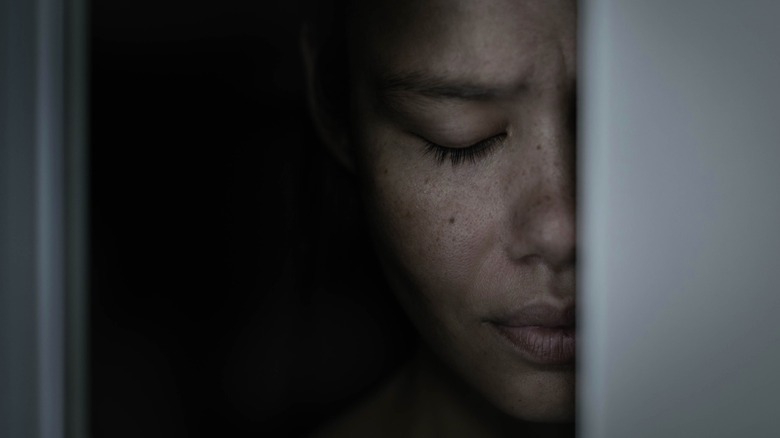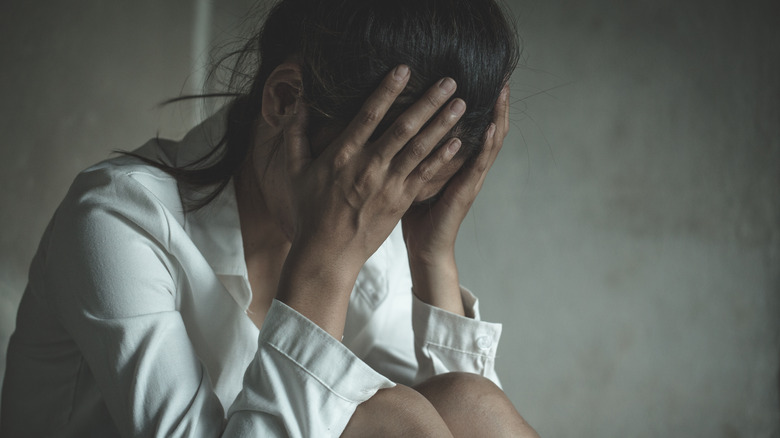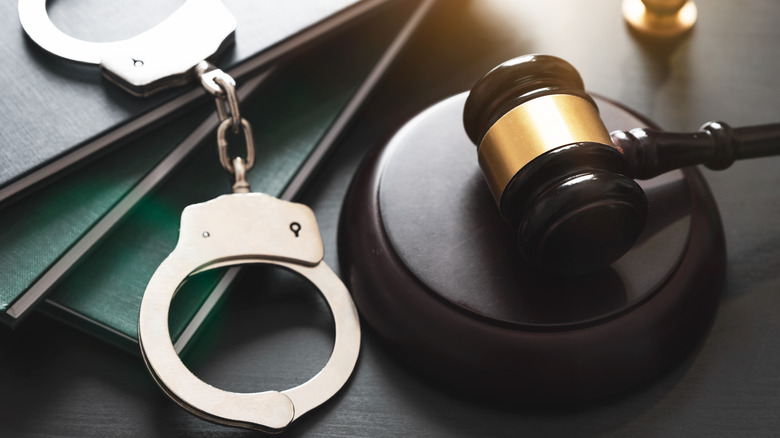What Does DARVO Mean And How Does It Relate To Sexual Assault Victims?
The following article includes discussions of abuse and sexual assault.
When the mini-series "Unbelievable" premiered on Netflix, Vulture called the series a "radical approach to crime storytelling." Based on the Pulitzer Prize-winning ProPublica article, "An Unbelievable Story of Rape," both the article and the mini-series went into the differences in how rape investigations are handled when a victim is believed versus when they're not.
In case you haven't caught "Unbelievable" yet, the story follows Marie, an 18-year-old who is raped at knifepoint during a home invasion. But after she starts going over details with the police during the investigation, they focus on her inconsistencies. Marie recants the story of being raped, first confessing to believing it was a dream before finally confessing she made the whole thing up (via ProPublica). Spoiler alert: She didn't make it up. Detectives caught the rapist years later in another state with photo evidence of what he'd done to Marie and others — after Marie had been charged, put on probation, fined $500, and went to court-mandated therapy for lying.
Marie's story is just one example of how victims of sexual assault and other forms of abuse and assault can be revictimized when they disclose what's happened — and not just by the person who physically assaulted them. This happens so often that, according to Ms. Magazine, researchers put a name to the tactic used to turn victims like Marie into the offender: DARVO.
If you or anyone you know has been a victim of sexual assault, help is available. Visit the Rape, Abuse & Incest National Network website or contact RAINN's National Helpline at 1-800-656-HOPE (4673).
This is what DARVO means
According to Jennifer J. Freyd, a professor emeritus of psychology at the University of Oregon, DARVO is an acronym "for Deny, Attack, and Reverse Victim and Offender" (via Vox). She explained that when DARVO is being used, "the perpetrator or offender may deny the behavior, attack the individual doing the confronting, and reverse the roles of victim and offender," making it seem as though the perpetrator is the true victim.
According to a study published in the Journal of Aggression, Maltreatment, & Trauma, perpetrators will take two tactics when applying DARVO. They'll either admit to doing what they're accused of and try and erase the current bad deeds by bringing up all the good they've done previously, or they will try to excuse their behavior. They will also do what they can to clarify that the assault or abuse was the victim's fault.
Perpetrators of sexual assault aren't the only ones who deploy DARVO. A study published in the American Journal of Community Psychology found that how society generally reacts to sexual assault victims fits into DARVO behavior. According to the study, only two-thirds of rape survivors come forward about being assaulted. When they do, the study found that one-quarter to three-quarters of survivors are met with blame or doubt from the person they disclose to, including police officers and other professionals.
Myths about sexual assault victims make DARVO easier to use
Being able to believe sexual assault victims, as shown in Netflix's "Unbelievable," relies heavily on perceived victim credibility. In their explanation of why expert testimony is essential in sexual assault cases, the National District Attorney Association (NDAA) explains that, more often than not, the average jury member won't understand the nuances of victim behavior. This understanding has foundations in long-perpetuated myths of how a sexual assault victim should behave.
When someone is sexually assaulted, they have an automatic physical reaction at the moment, triggered by a fear response. If you've heard of "fight or flight," you already understand what a fear response is. However, recent literature has updated the responses to include "freeze or fawn," per Psychology Today. A victim may continue to have this response to unrelated events even after the physical danger has ended, adds Loyola University Counseling Center, especially if they encounter something that reminds them of the event.
Victims of sexual assault may also experience symptoms of PTSD which, according to Verywell Mind, can include flashbacks, headaches, nightmares, insomnia, hyper-vigilance, trouble concentrating, mood changes, and avoiding reminders of the event.
But everyone's reaction to both the assault itself and its aftermath is as unique as a fingerprint. However, lawyers still come across members of juries who believe the myth that if a victim behaves or looks a certain way, they're lying, asking for it, or exaggerating (via NDAA).
These myths about sexual assault victims are still believed today
These myths about sexual assault victims have a long history, rooted centuries deep in the cultural consciousness (via Marquette University). Everyone from jury members to responding officers has to fight against these internal biases, and we see this play out in social media commentary when victims come forward; many signed an open letter in defense of Amber Heard, for example. During her recent court battle with ex-husband Johnny Depp, Heard was the subject of one of the "worst cases of cyberbullying and cyberstalking by a group of Twitter accounts," according to Bot Sentinel, a company that tracks disinformation and harassment on social media (via Forbes). The hashtag #AmberHearsIsALiar was trending on Twitter during the trial.
The backlash against Heard was a very public reminder that myths about the perfect victim still heavily influence society. People doubt victims if they don't fight back, per Our Resilience. They also tend to not believe a victim if they're not crying when they disclose, or if they were under the influence of drugs or alcohol when the event occurred. This doubt translates to the exact goal of DARVO: ensuring the victim is given some if not all the blame for the abuse they've endured — if it's believed the abuse happened in the first place (via Journal of Aggression, Maltreatment & Trauma).
For victims, this can mean not just re-victimization, but can also end in legal consequences if their disclosures aren't believed.
The consequences of DARVO for sexual assault victims
One woman who participated in the study published in the American Journal of Community Psychology mentioned above said that when she told her sister that, after being given a free motel room by someone she had just met, the person raped her. According to the woman, the sister's response was one she expected to have if she had gone to the police or hospital: disbelief and victim blaming. So she stayed silent about what happened to her for 19 years.
For victims who do disclose to authority figures, the stakes can be high. BuzzFeed News spoke with Nikki Yovino, who was spending a year in prison after taking a plea deal for being charged with "filing a false report to law enforcement and evidence tampering." Since law enforcement believed Yovino was lying about being raped, having a rape kit performed was seen as tampering with evidence. Detectives repeatedly questioned Yovino on a couch in her basement — Yovino says it was for hours, detectives say 45 minutes — about the details of her assault.
It was explained later in court the questioning, as well as telling Yovino they had videos from the party where she was assaulted even though they did not, was done because Yovino seemed "deceptive" during her initial interview. If Yovino was being truthful, detectives expected her to refute what they alleged happened.
The number of false rape reports is lower than you think
Further research by BuzzFeed News found that between the years 2013 and 2018, around 127 women were charged with similar offenses. But whether or not these were true cases of women lying about being raped is murky.
For one thing, no one agency collects or oversees the data about false rape reporting, let alone how often these cases end up in court (via ProPublica). But there's also no set definition for what a false rape report is, meaning that, as the National Sexual Violence Resource Center explains, even if a rape occurred but there wasn't enough evidence to pursue the case legally, law enforcement can classify the report as false (or unfounded, which many incorrectly assume is synonymous with "false"). Studies also show "delayed reporting, victim indifference to injuries, vagueness, victim's attempt to stay away from sharing unsafe details, suspect description," and the location the assault happened have all been reasons law enforcement has given for classifying a rape allegation as "false."
Joanne Belknap, a sociologist, criminologist, and professor at the University of Colorado Boulder told The Cut that the current statistics on false rape reports — that 5% of reports made are false allegations — are misleading. Not only are these studies about false reports conducted solely on college students, but the number of college students who have experienced sexual assault is estimated to be 95% higher than the actual reported events.
Belknap adds that, unfortunately, sexual assault cases come down to what (or who) people want to believe.
If you or anyone you know has been a victim of sexual assault, help is available. Visit the Rape, Abuse & Incest National Network website or contact RAINN's National Helpline at 1-800-656-HOPE (4673).





